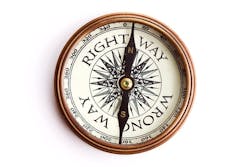I start this month’s discussion with a thought-provoking quote from the esteemed organizational theorist Russell L. Ackoff:
“The righter we do the wrong thing, the wronger we become. When we make a mistake doing the wrong thing and correct it, we become wronger. When we make a mistake doing the right thing and correct it, we become righter. Therefore, it is better to do the right thing wrong than the wrong thing right.”
It’s a bit of a tongue twister, which I will, in my own way, try to explain. In particular I’ll try to demonstrate how this relates to what we do, working in the collision industry.
Isn’t it true that we all strive to do things better in our businesses? Daily we meet challenges head on, grapple with the day-to-day trials that customers seem to throw at us and firefight to please everyone most of the time.
Many collision shop owners have worked out that life needn’t be like this, and have gone through a systematic process of trying to analyze the individual problems to try to stop them before they happen. It’s true that as business owners, we recognize that individual problems in our businesses need to be eradicated, which often requires some smart thinking in order to design processes that eliminate, or at least significantly reduce, individual challenges.
It’s not only the unexpected problems that we attempt to solve, it’s also about implementing processes in order to make our ‘system’ of repairing vehicles more efficient. Efficiency drives what we do in order to make a profit. We streamline our organization and dissect it into its component parts in order to neutralize that critter that keeps destroying our well-oiled machine. My experience demonstrates to me that most shop owners do this sort of thing in their own way, and from their experience in doing those things they see benefits to their businesses from their hard work.
Now let’s look at Ackoff’s first sentence, and see how it may apply to collision repair:
“The righter we do the wrong thing, the wronger we become.”
What if all of the effort we put into doing the better (righter) thing in our business is actually being carried out on the ‘wrong’ thing? What if we are channelling our great intentions and efforts into improving something that is not actually the thing that’s broken and what if the real thing that is broken is actually the ‘system’ itself?
Don’t we just assume that we know how to repair cars? Don’t we just assume that because almost every other collision shop repairs cars this way it must be the ‘right’ way? What if, inherently, it is actually the ‘wrong’ way to repair cars, and we just keep trying day-in, day-out to improve what is a broken system in the first place?
What I’m questioning is whether we are currently repairing vehicles in the correct way and by the correct process in order to achieve our real goals, without realizing that the ‘system’ we use to run our businesses might be inherently wrong.
Please bear with me. According to Ackoff’s statement, “When we make a mistake doing the wrong thing and correct it, we become wronger.” How can this be so? Well, if the system is inherently wrong, then no amount of rectification to individual parts will make the ‘system’ a better system. It’s still wrong and effort and energy have been wasted in order to stick a Band-Aid on what is not really the problem.
If the system is inherently the correct one, but with areas that require resolve, then when those areas are corrected, the system becomes better. Remedial work that is ‘systemic’, not ‘systematic’, i.e. not dealing with an individual problem in isolation, always wins because it takes a holistic approach to the overall outcome of the business, not the department.
Interestingly, when Ackoff says: “Therefore, it is better to do the right thing wrong than the wrong thing right,” he has a point.
Distilled down to the core meaning as far as a collision shop is concerned, this is called ‘systems thinking’ and it’s systems thinking that takes a systemic approach to problem solving, process design and organizational theory. Some years ago, my team studied systems thinking, among other theoretical operational methodologies and recognized that the whole process of collision repair is just plain wrong. It’s actually not fit for purpose, and clearly is not conducive to running a business with 21st century challenges for profit and customer prerequisites.
Current processes, culture, technologies and thinking need to almost be thrown out of the window. The question was, how different would a body shop be if running a systems-based solution? I’ll elaborate on this next month, but if what I’ve said here intrigues you, you can always email me.
Jon Parker is managing director of the Byteback Group, a U.K.-based information technology and services company aimed at advancing the collision repair industry. Parker can be reached at [email protected].
